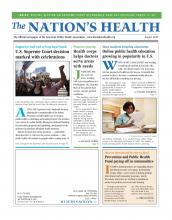A recent study shows a troubling disconnect between what patients want out of doctor's visits and what they get.
Although most people would like to participate in the decision-making and information-sharing process with their doctors, they consider doctors to be authoritarian figures uninterested in collaborating with patients, according to the study, which was published in the May issue of Health Affairs.
Many of the participants said they felt like scolded children during most of their doctor's visits, and feared that asking questions would imply a challenge to the doctors' expertise and authority.
“If I were to do that I would think…is the guy going to be (peeved) at me for not doing what he wanted?” said one patient. “Is it going to come out in some other way that's going to lower the quality of my treatment?”
The study found that most patients felt that acting assertive would give them a reputation as a difficult patient, and suggested these feelings came from society’s strong suggestion of certain roles for doctors and patients. Society says doctors know best, and patients must conform to that, even if they feel pressured into silence and compliance, according to participants in the study.
Participants also felt that the structure of visits did not provide sufficient time to ask questions. They said it seemed everyone was always in a hurry, and they felt guilty about taking up the doctor’s time. One respondent said he apologized to his doctor for saying he needed more time to consider having surgery.
The study consisted of 50 patients, most of them well-educated and fairly affluent.
“Although our study doesn’t allow us to draw conclusions about how common these concerns are, it is difficult to imagine that people who are less well-off would not share these concerns, said study lead author Dominick Frosch, PhD.
Research has shown that ideally, physicians and patients should work together to make decisions about patient care. But studies also show that clinical practice is far from the ideal.
The study said such lack of communication could mean that doctors might miss a reasonable alternative option to treat a condition.
Patients feel extreme pressure to conform to the role of a docile patient, and even more assertive ones feel that doctor's visits are structured to prevent any form of shared decision making, researchers said.
The study suggested several possible methods of combating the lack of communication and helping patients feel safer participating in the decision-making process.
With regard to patients, the study suggested providing support tools so that they do not feel overwhelmed by short appointments, and do not fear asking questions even if the waiting room was overcrowded.
The study also said that reorganizing care so that physicians see fewer patients would allow for more communication during visits, as would using technology to share information and facilitate communication over a longer period of time.
Along with those structural suggestions, researchers also said that cultural issues would have to be addressed. Physicians need to be aware of patient fears and create a safer environment, and patients must believe that their participation is both tolerable and desirable.
“Medical consultations should be a place where patients can feel safe about being open with their concerns and opinions,” Frosch said. “Otherwise, we can’t really call it patient-centered care.”
The study was conducted by researchers at the Palo Alto Medical Foundation Research Institute and the Dartmouth Center for Health Care Delivery Science.
The study is online at www.healthaffairs.org.
- Copyright The Nation’s Health, American Public Health Association









